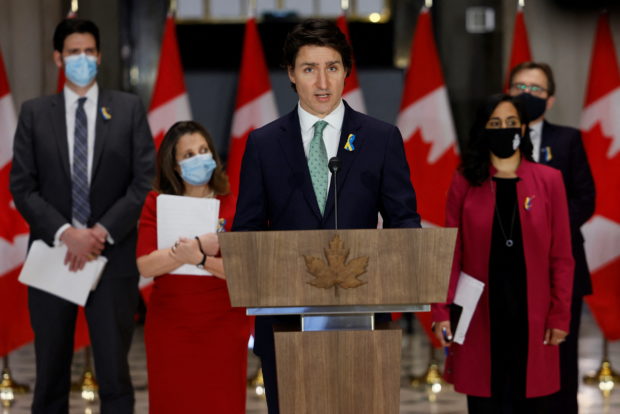
Canada’s Prime Minister Justin Trudeau attends a news conference with government ministers in Ottawa, Ontario, Canada February 28, 2022. REUTERS/Blair Gable
OTTAWA — Canada will supply anti-tank weapons and upgraded ammunition to Ukraine to support its fight against a Russian invasion, Prime Minister Justin Trudeau said on Monday, and it will ban imports of Russian crude oil.
“Canada will continue to deliver support for Ukraine’s heroic defense against the Russian military,” Trudeau told reporters in Ottawa. “We are announcing our intention to ban all imports of crude oil from Russia, an industry that has benefited President Putin and his oligarchs greatly.”
Canada has already sent weapons and non-lethal support to Ukraine, and has backed a number of sanctions, including supporting the removal of Russia from the SWIFT system for international bank payments.
“We are providing even more lethal aid to Ukraine, and we’ll be sending 100 Carl Gustaf anti-tank weapon systems and 2,000 rockets, which we will be working to deliver as quickly as possible,” Defense Minister Anita Anand said.
Canada imported C$289 million ($228 million) worth of Russian energy products in 2021, according to Statistics Canada.
Canada is the world’s fourth-largest oil producer, but the vast majority comes from Alberta, far from eastern Canadian refineries owned by Irving Oil, Suncor Energy, Valero Energy Corp and Cresta Fund Management.
Eastern refiners import oil on the spot market when needed, as well as fuels to meet demand during maintenance shutdowns, said David Schick, a vice-president with the Canadian Fuels Association.
The Russian oil ban applies only to crude oil for now, but the government is looking at oil derivative products next, a government source said.
In 2021, shipments included naphtha and diesel to Valero’s Quebec refinery and deliveries of diesel and gasoline to a refinery in Newfoundland & Labrador, now owned by Cresta Fund Management, said Jim Mitchell, head of Americas Oil Analysts at Refinitiv.
Cresta is repurposing the idled Newfoundland refinery to produce renewable fuel.
Irving does not import Russian oil, a spokeswoman said. A Suncor spokeswoman said the company does not process Russian crude in any of its refineries. Valero and Cresta did not immediately respond.
Canada also played a role in restricting Russia’s central bank from being able to access its foreign reserves.
Trudeau said his government has asked the independent Canadian Radio-television and Telecommunications regulator to drop Russian state-owned broadcaster RT, saying that “it is important that Canadians and people around the world be faced with accurate information.” Canadian cable operators said on Sunday they would voluntarily drop RT.
Earlier on Monday, Foreign Minister Melanie Joly said the G7 group of nations would bring more sanctions against Russia.